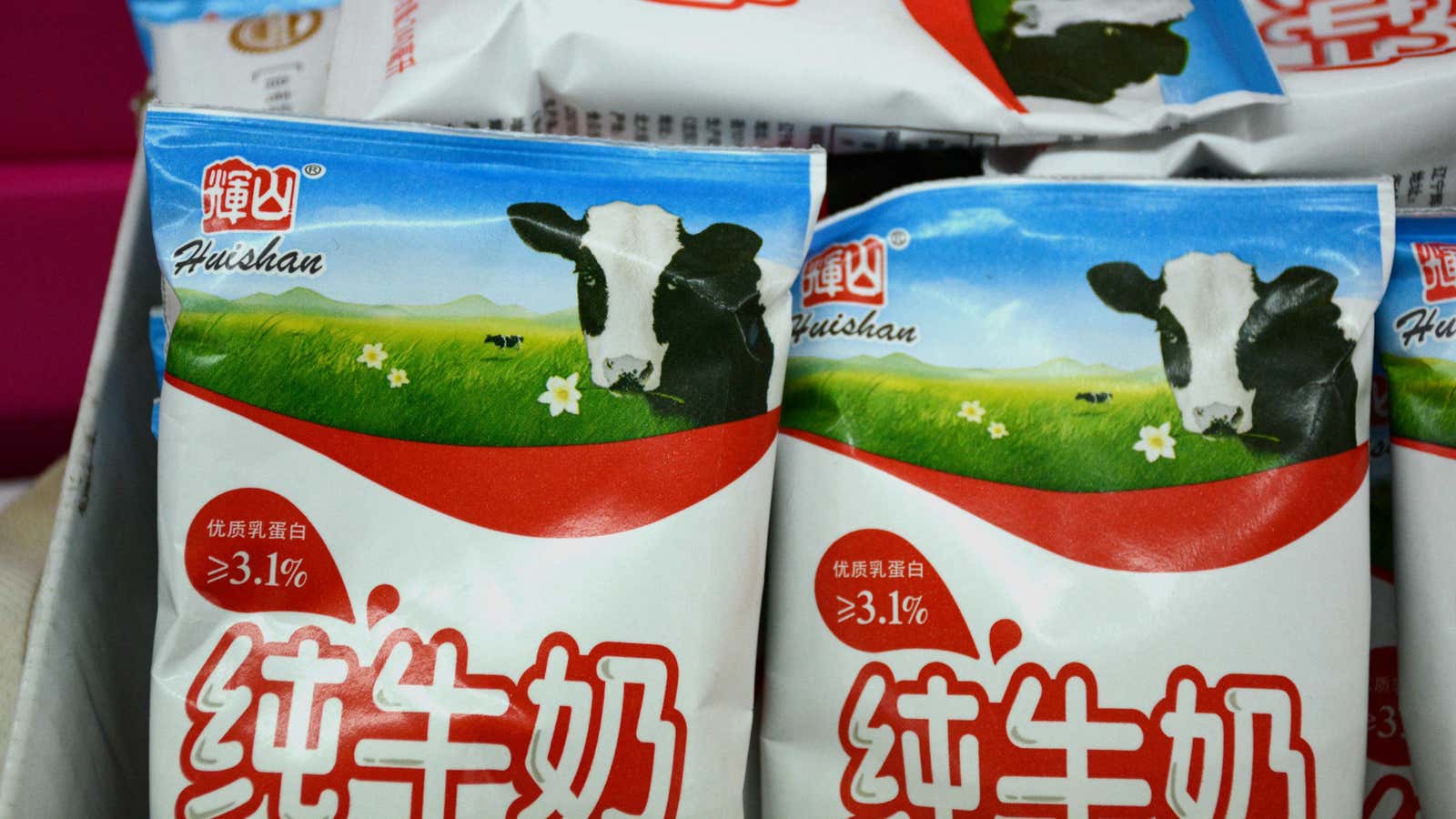A mysterious collapse in a Chinese dairy maker’s shares last week has renewed fears that China’s financial system is so shaky that authorities can do nothing but to muddle through a credit crunch.
Shares of China Huishan Dairy Holdings plunged 85% in an hour on March 24, wiping more than $4 billion from its market value. The crash, the biggest-ever intraday fall in Hong Kong, prompted an indefinite trading halt. It also caused collateral damage to firms linked to the Liaoning-based company, which has more than 11,600 employees and operates the largest number of dairy farms in China. Market observers are still trying to figure out what exactly triggered the sudden sell-off.
A company statement (pdf) filed to the Hong Kong stock exchange today (March 28) unearthed at least part of the mystery. In its first public comments since the stock crash, Huishan confirmed media reports that it had missed interest payments to its creditors, and that on March 23 the Liaoning provincial government held a meeting with the company and its 20-plus creditor banks to discuss remedies.
According to the statement, the Liaoning government proposed an “action plan” to solve any overdue interest payments within two weeks and to help improve Huishan’s liquidity position within a month. Some creditors—including Bank of China and Jilin Jiutai Rural Commercial Bank—pledged in the meeting that they “would continue to have confidence in the Group [Huishan] which has over 60 years of operating history,” said the statement.
The company also dismissed previous reports that it had issued fake invoices, and that chairman and controlling shareholder Yang Kai had misappropriated funds to invest in real estate in Shenyang, Liaoning’s capital. The statement confirmed that Yang’s wife Ge Kun, who is also an executive director in charge of relationships with the company’s principal bankers, has been out of contact since March 21, the same day that Yang learned of the late payments.
Financial news outlet Caixin revealed more details (link in Chinese) about the bailout package, based on an interview with creditor Hongling Capital head Zhou Shiping, who was at the March 23 meeting. The Liaoning government will pay over 90 million yuan ($13 million) for land owned by Huishan to inject cash into the company. It also ordered financial institutions involved not to downgrade the company’s credit rating or file lawsuits against it.
Citing unnamed creditor sources briefed on the meeting, Caixin also reported (link in Chinese) that Yang pledged to raise 15 billion yuan to solve the liquidity crisis through selling some of his shares in the company.
Quartz was unable to contact the company or the Liaoning government’s financial office, despite repeated attempts. Local media reported today (link in Chinese) that the police cordoned off Huishan’s headquarters in Shenyang, preventing creditors and journalists from communicating with the company.
Cows as collateral
Since the end of last year Huishan has been a prime target of short sellers, such as the hedge fund Muddy Waters. But prior to last week’s stock plunge, its shares had been among the most stable in Hong Kong, as Yang is believed to have pledged his shares (paywall) to buying even more of them, in an attempt to defend the stock price.
Today’s statement also revealed that Yang and Ge have pledged two-thirds of the Huishan shares they own, or half of the company’s total shares, as collateral for loans or as margin finance for stock trading. But such debt-fueled buying can’t go on and on, as the Financial Times explains (paywall):
Both sorts of loans tend to have strict limits following share price falls, after which point the borrower must either top up the collateral with more shares, repay some cash, or forfeit some shares. Typically the first of those limits sit about 20 per cent under the share price at which the loan was made.
The company’s profit has shrunk in the past few years, in part thanks to falling milk prices amid a global supply glut. But that didn’t stop its investment spree, powered by loans that in some cases used cows as collateral.
The Chinese government can’t afford to let Huishan fail. Credit markets already deeply distrust the rust-belt Liaoning province. Authorities there were revealed to be faking economic numbers, including the province’s GDP growth, from 2011 to 2014. The province was the only province that fell into recession last year. Meanwhile local firms Dongbei Special Steel and Dalian Machine Tool went into default last year.
If Huishan does go bust, the fallout could also be disastrous for some Chinese banks. At least one of them has already felt the chill: Jiutai Bank, which is the dairy maker’s second-biggest creditor, saw the biggest one-day drop in its shares this week. According to Caixin, the small bank’s loan to Huishan currently stands at around $266 million, bigger than its estimate of impairment losses on bad loans for the whole of 2016.
The situation is not much easier for the midsize Ping An Bank, which lent nearly $300 million to Yang’s offshore entity Champ Harvest, with a 25% stake in Huishan as collateral. If Ping An were to write off the loan in full, estimates Daiwa Capital Markets (paywall), its pretax profits could drop by 2% this year.
